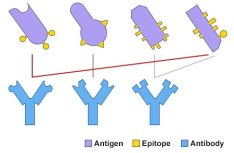
Vaccsbook

Infectious Diseases . . . and How to Avoid Them
Antibodies and Antigens

This information is for entertainment purposes only. It has not been verified by a third party. Last updated: a while ago.
Antibodies and Antigens are complex protein molecules, one good, one bad, which are central to the immune response to an infection.
Antigens are the bad guys.
Antigens are molecules which exist on the outer surface of all
microbes .
Antigen molecules all have small bumps ("epitopes") on their surface.
Every antigen is unique to its microbe; each bump has its own distinct shape.
When a microbe enters an individual's body for the first time,
it causes symptoms and starts to adversely affect the function of the body's tissues and organs.
The microbe is also detected by blood cells of the immune system, which start to produce complex protein molecules called antibodies.
Antibodies are the good guys.
But . . . it takes a few days to produce antibodies, and if the microbe is really aggressive,
the infection may be fatal before the antibodies are made.
Antibodies are made by blood cells of the immune system to exactly match the antigen and its "bumps".
Then the antibodies lock into the antigen, and other cells of the immune system recognize the antigen-antibody and destroy the microbe.
The antibodies are "remembered" by the immune system so the next time the same microbe (with the same antigen) enters the body,
the right antibodies are immediately available and the microbe is destroyed before it can do any damage or cause any symptoms.
Back in the day, if people survived the disease, they acquired "natural immunity".
Vaccines try to mimic a microbe so antibodies are produced without the patient getting sick.
Sometimes booster doses of vaccine are needed to create enough antibodies to fight of the next infection/exposure.
But whether antibodies are produced by a vaccine or "naturally", they can disappear over time requiring another vaccination,
or risk catching the disease again.